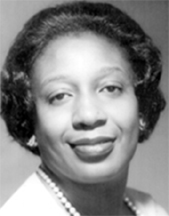1920 – 2003
Dedicated human services worker and trailblazer
Effie Robinson graduated from San Francisco State University magna cum laude in 1943 and was the first African American to receive a social welfare degree from the University of California, Berkeley. A woman known for her intellect, street smarts and for being an exceptional supervisor, she was one of the first African American social workers in San Francisco. In 1945 she joined the Family Services Agency of San Francisco as a casework supervisor and was appointed the organization’s Executive Director in 1956. She worked with the agency for a total of 20 years. In 1961, the San Francisco Examiner listed her as one of ten most distinguished women in San Francisco.
In the late 1940s, Robinson and Dr. Dan Collins were founding members of the Fillmore Democratic Club. Because of her interaction with then Congressman John Shelley in the early 1950s, Mayor John Shelley appointed Robinson as director of senior housing for the San Francisco Housing Authority in 1964. In 1973 she became director of senior programs and in 1975 was honored as the Koshland Award Winner for “Outstanding Administrator for Social Services in California.”
“She was just a brilliant woman, who combined her extraordinary intellect with a kind of street understanding,” said former San Francisco Mayor Art Agnos, who worked as her assistant at the San Francisco Housing Authority. “She also had the courage to stand up to bullies who sometimes tried to push her around.”
Robinson was level headed, psychoanalytic oriented and related very well to her colleagues. She helped people of all ages and backgrounds to achieve a better quality of life. Even after her retirement, she was involved with the annual Martin Luther King essay contest for youth in San Francisco. Her ongoing project was with Lowell High School students, encouraging their involvement with international affairs, the people of the world and the United Nations Association. To this day her initiatives continue to help low-income families, school children and seniors.
